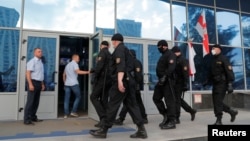The space for independent media to work in Belarus is getting smaller, as authorities label news outlets as extremist organizations and imprison journalists.
The latest to be persecuted under the country's law against extremist organizations is freelancer Ales Lyubyanchuk.
On October 27, a Minsk court sentenced Lyubyanchuk to three years in prison for participating with an extremist organization.
Lyubyanchuk had contributed stories to several news outlets and previously worked for Poland-based Belsat TV, reporting on events including mass protests after President Alexander Lukashenko claimed victory in the contested 2020 elections.
"Many leading independent media in Belarus today are recognized as 'extremist organizations'," said Andrei Bastunets, chair of the Belarusian Association of Journalists (BAJ).
Enacted in 2021, the law against extremist organizations applies not only to the leaders of these so-called groups but to those deemed to have participated with such groups. That extends to people who gave interviews to media outlets, including Zerkalo — the prominent media outlet previously known as Tut.By — BelaPAN and Radio Liberty, Bastunets said.
"Even for an interview, we are seeing people prosecuted for 'complicity' with extremist group activities," Bastunets said.
Those convicted can face up to seven years in prison.
The threat of legal action adds to the risks for media, already under pressure after the contested election.
Mass protests took place across the country after the 2020 vote, with thousands of protesters and opposition members detained, including dozens of journalists.
Since then, some of the country's largest and best-known independent media were forced to leave, Bastunets said.
For those organizations, their work is either completely based outside of Belarus if they don't want to risk the safety of correspondents, or they use a "hybrid format," where stringers use pseudonyms or work under the condition of anonymity.
Belarus still has some independent journalists and editorial offices inside the country, Bastunets told VOA's Russian Service. "But it is clear that they are under strong pressure from the authorities, and this greatly affects their editorial policy."
The Belarus embassy in Washington did not respond to VOA's request for comment.
But Lukashenko has previously said data showing high numbers of journalists in prison in Belarus was "misinformed." In a May 2022 interview with The Associated Press, Lukashenko said Belarus has "true freedom of speech" and that whether a person is a journalist or a politician, "the law is one, and it must be observed."
'No one left'
Igor Ilyash, who works for outlets including Belsat TV, believes the "extremist organization" law has added to an already repressive environment.
Under the law, "even minimal interaction with [so-called extremist organizations] entails criminal prosecution," Ilyash said.
"In 2021, the authorities tried to expel independent media from the country, shutter them and destroy them," Ilyash told VOA. "Then in 2022, we are seeing a wave of cases for cooperation with the media."
Ilyash's wife, Katerina Andreeva, who is also a Belarusian journalist, is currently imprisoned in Belarus for her reporting.
The persecution of those who speak with media "is a new stage in the constriction of totalitarianism, when not only journalism itself is illegal but any interaction with a journalist is criminally punishable," Ilyash said. "This demonstrates the conditions in which journalism is in, in Belarus in general."
The risks to journalists and their sources are changing how media operate, Ilyash said.
"I know that journalists prefer to do this in deserted places. For example, in the forest. And I'm not exaggerating — these are real stories. Journalistic activity in Belarus is driven underground," he said.
Belarus media now working outside the country's borders rely on their audiences to send information.
Olga Ratmirova, head of investigations at the Belarusian Investigative Center, said, "We continue to work from abroad. And we succeed, thanks to the audience's credibility. … This suggests that Belarusians have a request for unbiased information."
Ratmirova said since her investigative media outlet left Belarus, its audience has increased.
"We are working to ensure that Belarusians receive information that does not broadcast the position of any particular media," she told VOA.
When asked whether journalists in exile receive any information about how their colleagues still inside Belarus work, Ratmirova said, "Personally, I get the impression that there is nothing and no one left."
She cited the case of Siarhei Satsuk, editor-in-chief of the news website Yezhednevnik, who investigated corruption in the medical field.
A court last week sentenced him to eight years in prison for abuse of power and incitement.
"Before his arrest, Satsuk handed over a letter to his colleagues, where he said that he would most likely be imprisoned, and that this was the work of those who cover corruption in medicine," Ratmirova said.
"Such trials continue, and now we can say that there are practically no independent media outlets left in Belarus. There are only journalists and media outlets that work from abroad," Ratmirova said.
Belarus has a poor media freedom record, ranking 153 out of 180 countries on the Press Freedom Index, where 1 denotes the best environment for media.
Reporters Without Borders, the watchdog that compiles the list, says media in Belarus "have never been more repressed by authorities" than since Lukashenko's reelection.
This story originated in VOA's Russian Service.








